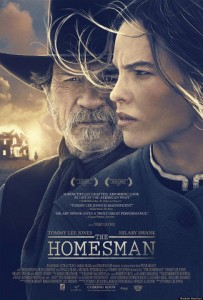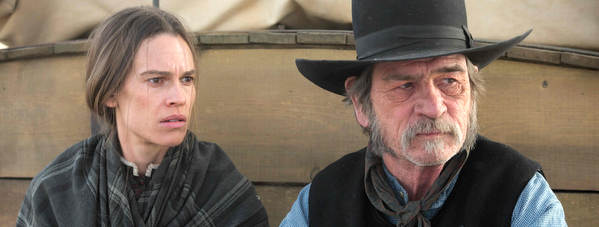REVIEW: Oscar Winners Hilary Swank and Tommy Lee Jones Amaze in the ‘The Homesman’ | Film Critic Thelma Adams | [usr 4]
With The Homesman, Director/Co-writer/Star/Texan Tommy Lee Jones confounds again, making brilliant American cinema on the back of the blockbuster dime he earned for Men in Black and The Fugitive, among many others. His taste is no-nonsense, astringent in its view of human nature, and unsentimental about the American West. As we learned in his less mainstream 2005 film with the unpronounceable title, The Three Burials of Melquiades Estrada, Jones is not about currying favor with the audience: ride along if you dare, and you’ll discover something authentic and unexpected. And, in both films, the performances are exceptional, from Melissa Leo in Estrada to Hilary Swank in The Homesman.
The atypical Western — and one of my favorite movies of 2014 — starts with a portrait of Swank’s plain-and-bossy Mary Bee Cuddy. She lives alone on the Nebraska prairie: driving a mule, fetching water, making supper. Her overly tidy cabin is an oasis of civilization that sets the scene for a muscular set-piece where Mary Bee invites a gristly neighbor, Bob Giffen (Evan Jones) to dinner and proposes to the man after a postprandial song that puts the sod to sleep. When Mary Bee says, “I can’t live without real music much longer” she’s not exaggerating.
 This set-piece grounds us in Mary Bee, her virtues and flaws, an aching loneliness more ungovernable than the mule. She is a good woman in a setting that offers no rewards or solace for such purity. And while this dinner sequence recalls one of my favorite scenes in Quentin Tarantino’s Inglourious Basterds – the introduction of the Christoph Waltz’s Nazi Jew-hunter, a villain at the family table – Jones exercises restraint, letting the scene unfold without snappy dialog or swirling camera movements (Rodrigo Prieto is the cinematographer). It remains both intimate and devastating.
This set-piece grounds us in Mary Bee, her virtues and flaws, an aching loneliness more ungovernable than the mule. She is a good woman in a setting that offers no rewards or solace for such purity. And while this dinner sequence recalls one of my favorite scenes in Quentin Tarantino’s Inglourious Basterds – the introduction of the Christoph Waltz’s Nazi Jew-hunter, a villain at the family table – Jones exercises restraint, letting the scene unfold without snappy dialog or swirling camera movements (Rodrigo Prieto is the cinematographer). It remains both intimate and devastating.
From there, the movie adopts the narrative form of a journey from the West to the East – against the grain of the typical Western. Mary Bee assumes the responsibility that no man in her small community will accept: taking three mad women (Miranda Otto, Grace Gummer, Sonja Richter, all terrific) back across the Missouri River to the relative sanity of Hebron, Iowa. As John Lithgow’s Reverend Alfred Dowd says, “Life gave them more than they could bear.”
Enter Tommy Lee Jones, hanging from a noose, as George Briggs, the sinner that Mary Bee’s saint recruits to be her wingman on this impossible journey with three justifiably feral women. Briggs is a wild, selfish, unreliable cuss, with wiry hair popping out of his brows and ears. Jones relishes the role. Somewhere, deep within this grizzled cowboy is a man that’s abandoned his humanity on the frontier. Can Mary Bee revive and lasso that soul? That’s just one of the movie’s questions, but redemption really isn’t what Jones is about.
Jones has the flashier role – he’s Gabby Hayes to Swank’s Randolph Scott – but Swank, a Nebraska native, has the lead. While she bears a little too much star charisma to be entirely plain, the reedy Oscar-winner (Million Dollar Baby, Boys Don’t Cry) demonstrates convincing restraint and unfashionable earnestness. Because Swank, Otto, Gummer and Richter (and Meryl Streep in a cameo) have full and juicy parts, I’m tempted to call The Homesman a feminist Western. There’s no need. That would be surrendering to a sort of Stockholm syndrome. We’ve gotten so accustomed to the underrepresentation of complex women in contemporary movies that when we see a drama like this we categorize it as “feminist” when we really should just embrace it as clear-sighted, intelligent and provocative.
Culled from Thelma Adams
Thelma Adams: website | twitter | facebook | rotten tomatoes





